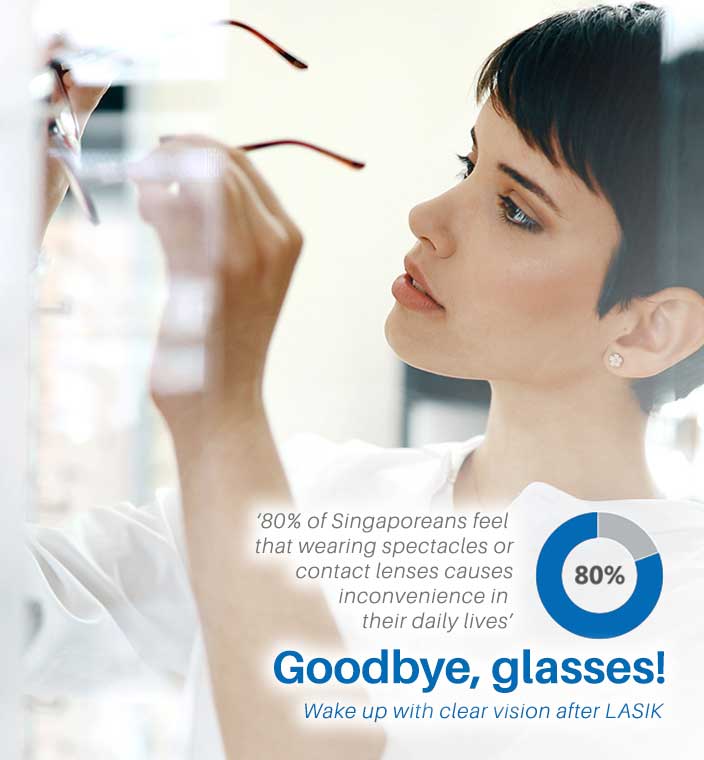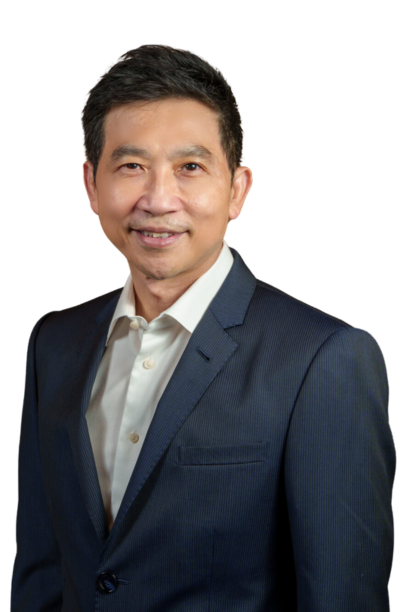Lasik Specialists
Goodbye, Glasses!
Glasses and contact lenses are only able to provide temporary vision correction. Some find them inconvenient when playing sports, travelling, or during daily activities.
On the other hand, LASIK is able to grant 24/7 visual freedom, allowing you to see clearly from the moment you wake up.
Is LASIK Suitable For Me?
LASIK is suitable for the majority of people who:
- Are over 18 years of age
- Have a stable eye prescription
LASIK is able to correct a wide range of refractive errors:

Our LASIK Specialists

Dr. Lee Hung Ming
MBBS (Singapore), M.Med (Ophth)
FRCS (Edinburgh), FAMS (Ophth)
Senior Consultant | Eye Surgeon
Sub-specialty: Cataract, Refractive Surgery, Cornea & External Eye Disease
Trusted Eye Specialist with Excellent Track Record
20+ Years of Experience
20,000+ Cataract & LASIK Cases
Former Head of Refractive Surgery at TTSH & NUH
Dr Lee Hung Ming was the first in Singapore to perform:
- Bladeless LASIK Surgery (2004)
- ICL Surgery for the Treatment of Myopia (2005)
- Laser-Assisted Bladeless Cataract surgery via Femtosecond Laser (2012)
Prior to his current appointment, Dr Lee Hung Ming was formerly the Head of LASIK surgery in 2 of Singapore’s premier hospitals — Tan Tock Seng Hospital (TTSH) and National University Hospital (NUH). Unbeknownst to many, he decided to become an eye specialist after losing his grandmother to eye disease and blindness.
A sought-after speaker at many international and regional eye meetings, Dr Lee was awarded the ACE Award, the highest educator award for training Asia-Pacific surgeons in cataract and refractive surgery, by the Asia-Pacific Society of Cataract & Refractive Surgery in 1994.
During his school days, he was the state badminton player for his hometown in Kelantan, Malaysia. Subsequently, he moved to Singapore to study under an ASEAN Scholarship. While in University, he played 6 sports for NUS Medical Faculty and captained the NUS Badminton Team. Apparently, he spent all his time on a badminton court, or courting his wife, a fellow medical student. They are now happily married with 4 children.

Dr. Tan Yar Li
MBBS (Singapore), M.Med (Ophth)
MRCSEd (Ophth), FAMS (Ophth)
Senior Consultant | Eye Surgeon
Sub-specialties: Glaucoma, Cataract, Refractive Surgery (LASIK)
Languages: English, Mandarin, Hokkien, Teochew
Fellowship Trained Specialist
Former Consultant at Singapore National Eye Centre (SNEC)
Former Deputy Head of the Department of Ophthalmology at Changi General Hospital
- Dr Tan Yar Li was awarded 3 gold medals for Best Candidate in Glaucoma,
- Vitreoretinal as well as Neuro-ophthalmology in the Eye Specialists’ Exit exam
- Dr Tan was one of the first few surgeons in Singapore to perform
- Minimally Invasive Glaucoma Surgery (MIGS)
Dr Tan obtained her Bachelor in Medicine and Surgery (MBBS) from the National University of Singapore. Thereafter, she did Ophthalmology residency training in Singapore and qualified as a Member of the Royal College of Surgeons of Edinburgh. She obtained her Master of Medicine (Ophthalmology) qualifications from NUS and completed a further 3 years of advance surgical training at the Singapore National Eye Centre.
Dr Tan obtained her specialist accreditation as a Fellow of the Academy of Medicine, Singapore (FAMS), where she was awarded 3 gold medals for Best Candidate in Glaucoma, Vitreoretinal as well as Neuro-ophthalmology in the Eye Specialists’ Exit exam. After having obtained her specialist accreditation, she also successfully completed her Glaucoma subspecialty fellowship training at the Singapore National Eye Centre.
Dr Tan has more than a decade of ophthalmology experience and her current clinical practice includes general ophthalmology, cataract and refractive surgery (LASIK and advanced surface ablation) as well as in the subspecialty field of Glaucoma. She is well-versed in performing cataract surgery with implantation of multifocal and toric intraocular lens for the correct of myopia, astigmatism and presbyopia.
Her current area of interest is in Minimally Invasive Glaucoma Surgery (MIGS) and she was also one of the first few surgeons in Singapore to perform these surgeries.
Prior to her current appointment, Dr Tan was a consultant ophthalmologist at the Glaucoma department of the Singapore National Eye Centre and Deputy Head of the Department of Ophthalmology at Changi General Hospital. She was also actively involved in the teaching of medical students, residents as well as paramedical staff. Dr Tan is currently a visiting consultant at the Singapore National Eye Centre.
Dr Tan genuinely cares for and listens to her patients as she firmly believes that patients’ outcome is the most important, and this can be only be achieved when there is a good doctor-patient relationship, which is the keystone to good medical care. Outside of work, she is a mother to 2 lovely kids and she is an avid runner and baker during her spare time.
Is LASIK Safe?
LASIK is an FDA-Approved procedure that has been shown to be predictable, accurate, and safe – with many years of clinical studies.
At Asia Pacific Eye Centre, we use the iLASIK technology. iLASIK is the “new and improved” version of LASIK. It is currently the only treatment safe and accurate enough for use on NASA Astronauts and US Navy SEAL personnel. iLASIK ‘measures and treats individualized imperfections that are never treated with standard or optimized treatment‘, making it a ‘potentially superior vision correction alternative.‘
As with any surgery, LASIK has risks. Common side effects of LASIK include dry eyes, haloes and glares. In most cases, these minor side effects lessen over time. More serious complications include corneal infections, retinal detachment and glaucoma. However, the chance of serious complications occurring is very low. Side effects and complications will be discussed with you in more detail during your pre-LASIK assessment.

Your LASIK Journey at Asia Pacific Eye Centre
- Step #1: Pre-LASIK Assessment
- Step #2: LASIK Surgery
- Step #3: Post-Operative Follow-Ups
The Pre-LASIK Assessment can be done any day from Monday to Saturday.
For contact lens wearers, please lay off your lenses at least for 5 days (soft lenses) to 2 weeks (hard lenses) before the assessment. This is to ensure accuracy of your eye test results and surgery. During the pre-LASIK assessment, you will undergo a series of eye tests to determine your suitability for the procedure. The doctor will discuss the different treatment options with you based on your eye condition and your preferences.

If you are found to be suitable for LASIK, the next step is to arrange a date for the surgery. Surgery slots are available every Wednesday morning and Friday morning.
When you first arrive on the day of surgery, you will be prepped – a nurse will clean your eyes, apply numbing eye drops, and you will change into a surgical gown. Next, it’s time for the big moment. Not to worry, a LASIK surgery only takes 15-20 minutes, you’ll be done in no time!
After LASIK, you will brought to the recovery room to rest for 20-30 minutes. Once you are rested, it’s time to head home. It is best to have someone to accompany you. For the first 6 hours after LASIK, your eyes may have a “sandy” feeling and your vision will be blurry – this is perfectly normal. As more time passes, your vision will gradually get clearer. In most cases, you’ll be able to resume daily activities on the very next day!
You are strongly advised to come for 1-day, 1-week, 1-month and 3-6 months follow-up visits. This is so that the doctor can monitor your recovery process and ensure that everything goes smoothly. Once you have been given the “clear” by your surgeon, you’re good to go. Enjoy your newfound clear vision, be free to do the things that you love!
Frequently Asked Questions
Anaesthetic eye drops are instilled before, during, and after the procedure. There will be some sensation of touch and minor discomfort during LASIK. However, it is a relatively quick procedure (15-20 minutes) that should not cause significant discomfort.
Both flap and flapless LASIK methods have their respective advantages and disadvantages. It is incorrect to say that one is “better” than the other. A LASIK surgeon will be able to make a tailored recommendation after examining your eyes.
Asia Pacific Eye Centre has both flap (Standard LASIK, iLASIK, Wavefront Customized) and flapless (Epi-LASIK) treatment methods.
There is no “best” method. It depends on your individual eye condition. For example, a patient with normal corneal thickness will most likely undergo standard LASIK – a safe, proven treatment for the majority of people. However, a patient with thin corneas may be recommended to do Epi-LASIK instead. Epi-LASIK is more painful and has longer recovery times, but is a good treatment option for people with thin corneas.
Rather than choosing a LASIK treatment method, choose a LASIK surgeon whom you feel comfortable with. Selecting an experienced surgeon will help to maximize the possibility of good surgical outcomes and minimize the risk of complications. It is best to choose a LASIK centre with multiple LASIK treatment methods available.
Vision will be blurry for the first 6 hours following LASIK surgery, after which it will gradually improve. Most patients can see clearly the next day, and return to work or school in 1-3 days’ time.
Aftercare is crucial in for smooth recovery and preventing infections. Follow your prescribed eye drop regime rigourously. Avoid exercising for 1 week. Avoid swimming and water activities for 1 month. Avoid going to smokey or dusty areas (eg. construction sites) for 2-3 weeks.
LASIK can be done as long as a patient’s degree is stable. In most people, refractive errors stablize after they have reached 18 years of age.
There is no age limit for LASIK. However, if you are over 50, you have a high chance of getting cataracts. In patients with cataracts, having LASIK done will not improve vision as the cataract will still cause blurred vision. In such cases, it is recommended that you do a cataract surgery instead – this removes the cataract and corrects myopia, hyperopia, astigmatism, and presbyopia at the same time.
Monovision LASIK is able to help one overcome presbyopia. Read more about it here.
The majority of people are able to enjoy clear vision after LASIK. In the odd chance that regression occurs, it is possible to do a LASIK enhancement if there is sufficient residual cornea thickness.
An MC of 1-3 days will be given for patients to rest after LASIK surgery. A 1-day MC can also be given during the pre-LASIK assessment and during post-operative check ups. Please inform our staff if you require an MC.
In most cases, LASIK is considered as a cosmetic procedure. That being said, most insurance companies do not cover LASIK. We have, however, come across a few patients who were covered for LASIK. If you are unsure, check with your insurance agent regarding your policy coverage.
In most cases, no. LASIK is considered as a cosmetic surgery.
However, if the difference in degree between your eyes is more than 3.00, you may be able to use your Medisave. In such cases, please inform our staff so we can make the necessary arrangements. Please note that claimability is subject to MOH and Medisave approval.
If you are above 50 years old, you may want to consider cataract surgery instead of LASIK. Cataract surgery can correct myopia, astigmatism, hyperopia, and presbyopia. It is considered to be a medical surgery. As such, it is Medisave (up to $2,450 per eye) and insurance (subject to policy coverage) claimable.
Lasik, for many people, is a permanent operation since it reshapes the cornea to correct vision problems like nearsightedness, farsightedness, and astigmatism. However, it’s important to remember that age, prescription changes, and underlying eye diseases can all have an effect on vision over time. Regular eye examinations are advised to monitor any changes.
LASIK is widely regarded as safe and successful for many people with common refractive problems. In many situations, it allows for a speedy recovery and eliminates the need for glasses or contact lenses. However, it is critical to have a full pre-surgical evaluation to confirm suitability and to discuss potential risks and advantages with an eye care professional.
Most patients see an improvement in their vision soon after having LASIK, however, some blurriness or fluctuations may occur during the initial recovery phase. Individual experiences may vary, but vision usually stabilises between a few days to a few weeks. Full visual acuity may take several weeks to months.
Whether LASIK is “worth it” depends on personal tastes, lifestyle, and visual needs. Many people find LASIK to be effective in lowering or eliminating their need for glasses or contacts. To make an informed selection, assess the potential benefits versus the dangers, consider personal preferences, and speak with an eye care specialist.
| PROCEDURES |
PRICE (excl. GST) |
PRICE (incl. GST) |
|---|---|---|
| Pre-LASIK Eye Screening | $197 | $215 |
| Standard LASIK (per eye) | $1,400 | $1,526 |
| ILASIK Wavefront Customized (per eye) | $1,688 | $1,840 |
| Implantable Contact Lens (both eyes) | $7,200 | $7,848 |
Book a Consultation
Get an eye checkup with us now!
Interested to fix a consult with our eye specialist? Get in touch with us!


